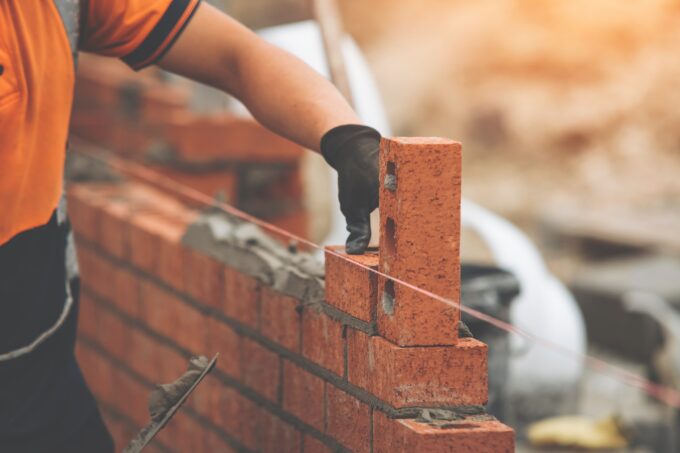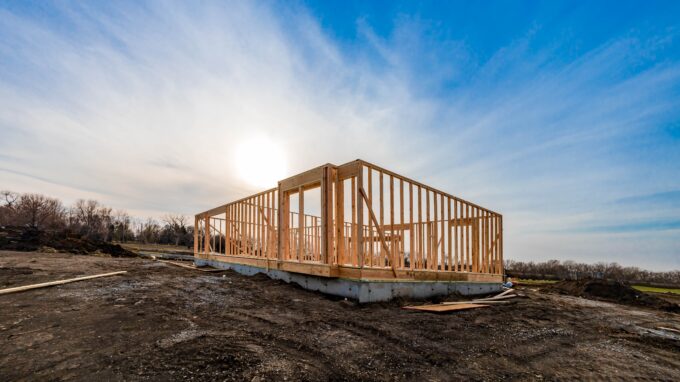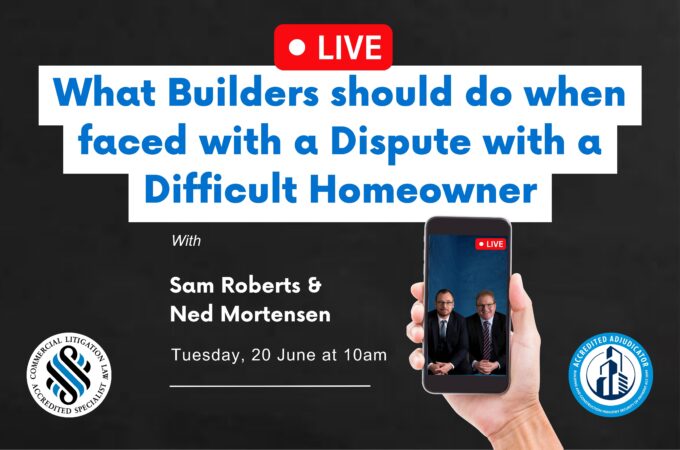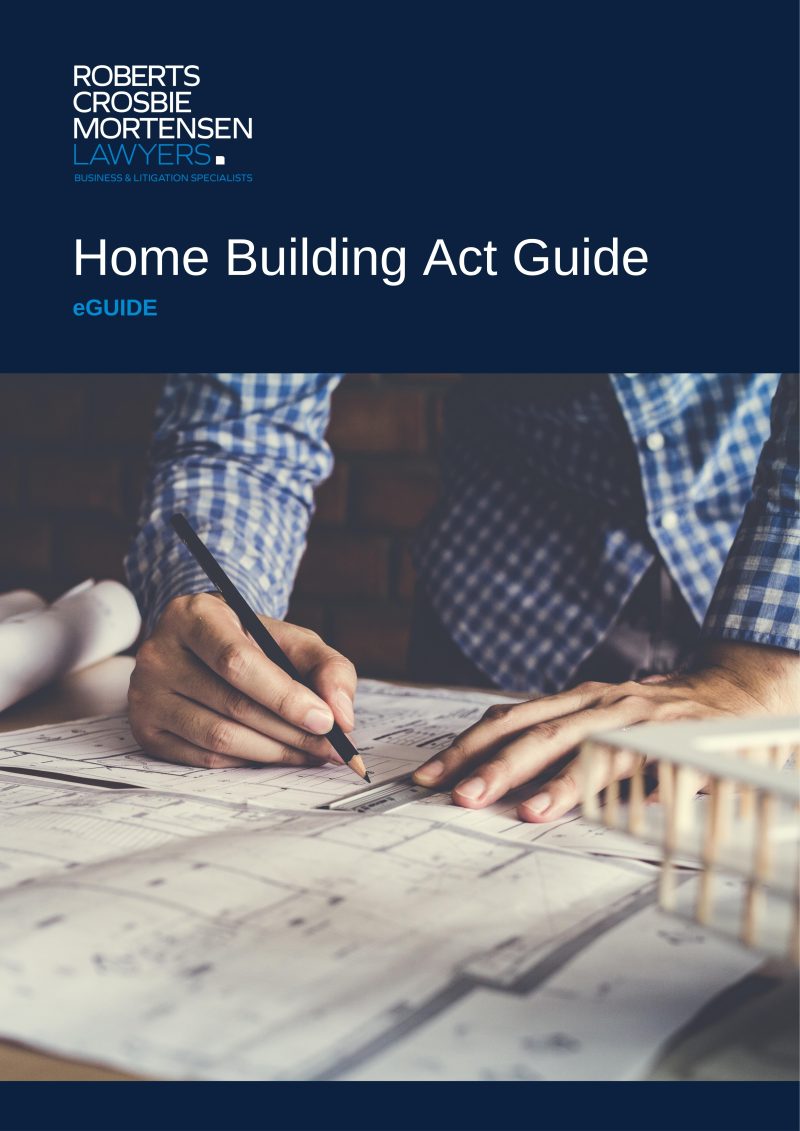Like our LinkedIn page to stay up to date and receive notifications about our live Q&A’s in future.
How to Get Paid in the Building & Construction Industry
On 12 May 2023 our Director and Accredited Specialist in Commercial Litigation, Sam Roberts and Principal Solicitor and Accredited Adjudicator, Ned Mortensen hosted a live LinkedIn Q&A answering How to Get Paid in the Building & Construction Industry utilising the Security of Payments Act.

What projects or work do SOP Laws apply to?
Almost all construction work in NSW.
Including:
- residential building work for contracts post October 2019,
- demolition work,
- supply of construction related good and services, and
- associated professions i.e. architects and engineers.
Excluding:
- construction work for the extraction of minerals.
What does the SOP Act consider to be a Construction Contract?
A construction contract or other arrangement, other arrangement being evidence that someone was invited to do construction work and they did it, that will trigger the Act.
What are the most significant rights created by the Building and Construction Industry Security Payment Act?
The right to:
- make regular progress claims.
- be paid promptly.
- Independent Adjudication.
- payment if a payment claim is not responded to.
What rights do Security of Payment Laws create and what can a party do if the if the other party does not respond to a Payment Claim?
It is essentially a statutory scheme to ensure all participants in the industry have a right to make a payment claim and get paid promptly.
If the other party does not respond to a payment claim, the claimant has the right to either:
- Apply to have the claim adjudicated by an independent adjudicator, or
- Statutory recovery of the debt in Court.
What level of detail should a Claimant include in a Payment Claim?
- Specific as possible in describing the work to which the payment claim relates.
- Changes on a case by case basic depending on the complexity of the work.
When is it Okay to ignore a Payment Claim?
Almost never, even if you think the payment claim is invalid you should always put on a payment schedule.
How do you know if a progress claim is also a Payment Claim under the SOP Act? When might a Payment Claim be invalid?
A payment claim:
- Identifies the construction work it relates to,
- Claims a specific amount for work done, and
- Contains an endorsement that it is a claim made under the SOP Act.
A payment claim must also meet other contractual criteria in order to be ‘valid’.
What is a Payment Schedule and what does it need to include?
A response made to a payment claim by the person liable to pay the payment claim that specifies the amount that they intent to pay in response to the payment claim and outlines reasons for any short payment.
Inclusions:
- Extreme detail – every reason that you think you may want to rely on in the future for non payment.
- You cannot raise reasons for non payment later in the adjudication process that were not originally raised in the payment schedule.
When can a party apply for independent Adjudication of a Payment Claim?
- If a payment claim has been served and a payment schedule has not been issued and are then not paid by the due date, or
- If a payment schedule has been issued but the claimant is not happy with the amount scheduled.
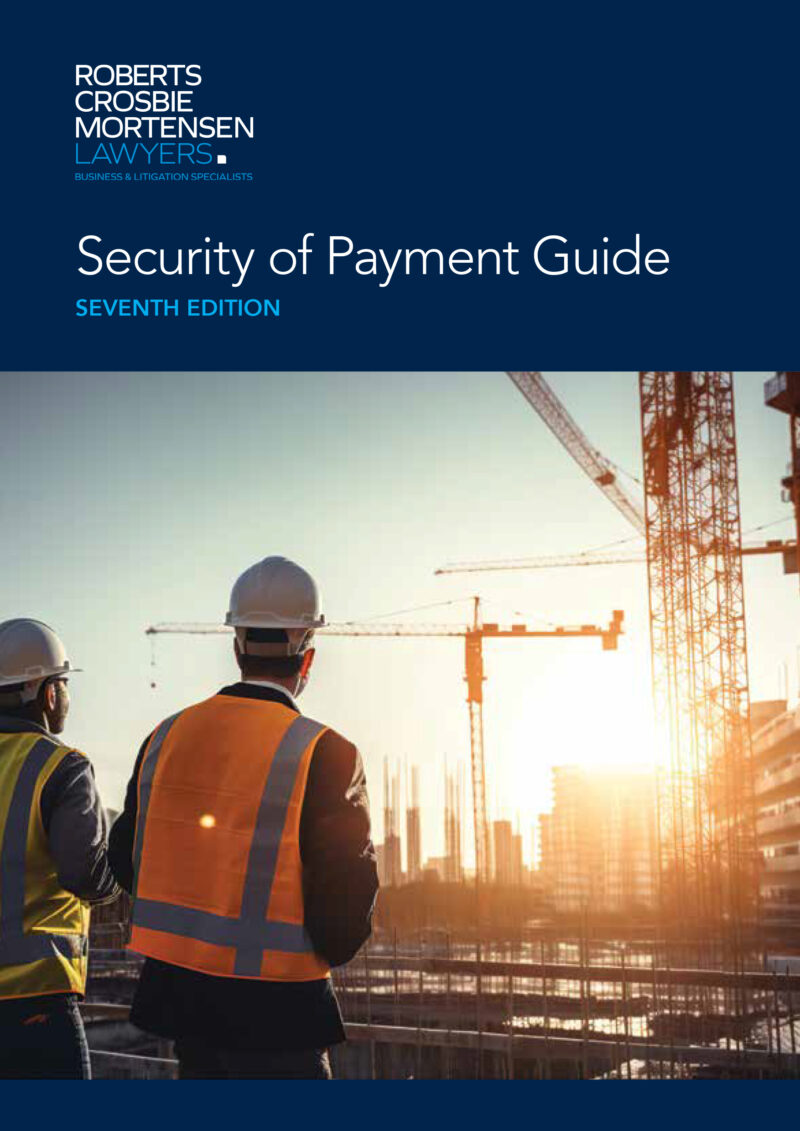


When can a party apply for Adjudication? What to watch out for in relation to time frames?
Most simply way: If you have been served a payment schedule you have 10 days to apply for adjudication, or
Most complex way: If you do not get a payment schedule, you have 20 days to serve notice of adjudication after the payment due date (if you did not receive payment), then 5 days to receive a payment schedule, then you can apply to adjudication within 10 of receiving the payment schedule or if you did not receive a payment schedule, at the expiry of the 5 days you have another 10 days.
Why are the time limits under the SOP Act so short?
To ensure that prompt payment is made to those that are entitled to it.
What is the Adjudication Process? How long does it take? What is the outcome?
The whole process generally takes about three weeks.
- Adjudication application to authorised nominating authority
- Adjudication response – within 5 days of the adjudication application served or within 2 days of an Adjudicator nominated
- Adjudication determination – generally within 10 days
- Payment – must be made within 5 business days of determination
When might you go to Adjudication instead of enforcing a Statutory Debt?
Adjudicate when the SOP Act clearly applies, your entitlement to payment for works completed is obvious and there is a clear method within the contractual documents for the Adjudicator to value the work.
An expert Building & Construction Lawyer will be able to advise you quite quickly if this is the case in your circumstances.
When does a right of suspension arise and what are risks of suspending work?
- If a claimant has not been paid the scheduled amount, there is a right to suspend work in two business days notice.
- If work is suspended the act indemnifies you from any claims from the head contractor for delays or damages.
- However, you need to be extremely careful, if you suspend work and it is then found that your payment claim is invalid, the protection that the act affords where you are not liable for liquidated damages, will not apply.
- Always seek advice from a specialist Building & Construction Lawyer before suspending work.
- Just because you can suspend, doesn’t mean you should.
What clauses should be included in a Construction Contract to help better use Security of Payment Laws?
The contract should align with the provisions of the Act.
As the claimant, you could include additional beneficial provisions, i.e.
- the ability to make more than one claim in a month,
- shorten the time for payment schedules to be provided, and
- reduce due dates for payment.
What things are considered as part of our Fixed Fee SOPA Rights Assessment service?
It is a $550 fixed fee service, delivered as below.
- Assess whether it is a valid payment claim.
- Assess the reasons provided in the payment schedule (if there is one).
- Review the contract and the provisions for valuing work.
- Provide advice about whether the claim should be sent to adjudication or a statutory claim made in court for the debt.
Listener: We are starting to see many more defences to not providing a payment schedule (eg invalid payment claim because a variation is argued to be a second contract). Do you have any tips on how to avoid this other than ensuring variations are linked to the contract.
That does not invalid the payment claim at all, if there is an arrangement whereby the construction work is done and a valid payment claim has been made, provided there is not more than one payment claim in respect of an available date, that is still a valid payment clam under the Act.
Listener: If my contract stipulates that I submit a payment claim on the last business day of the month, however I don’t submit it until the 1st or 2nd of the following month, is that claim under the act determined to be the claim for the previous month or the following month?
It is still valid, as according to the Act a claimant is able to make a payment claim on or from the last day of the month, or earlier if the contract permits.
Building and Construction Lawyers for Sydney and Newcastle
Need Answers Fast? Contact Us Today
The information in this article is not legal advice and is intended to provide commentary and general information only. It should not be relied upon or used as a definitive or complete statement of the relevant law. You should obtain formal legal advice specific to your particular circumstance. Liability limited by a scheme approved under Professional Standards Legislation.







